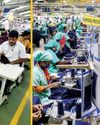When one thinks of Indian agriculture two images invariably come to mind; that of a bare-footed farmer ploughing on a dry field and of FCI warehouses overflowing with food grains.

This dichotomy of deprivation amidst abundance portrays the true picture of Indian agriculture. Agricultural production is growing but benefits of that growth are not reaching the farmers despite repeated promises, like doubling farmers’ income.
Farmers’ lobby put the blame on low prices of farm produces. While the government has raised the MSP by 1.5 times of input cost, this has not helped the farmers’ cause much. As per the Shanta Kumar Committee, only 6% farmers get the benefit of MSP. If this is true, the raising of the MSP by 1.5 times of input costs has no meaning for the remaining 94% of the farmers. The food prices have remained low putting further pressure on farm income. In fact, retail food price index declined 2.17% last January. In February, it declined 0.66% compared to 4.44% rise in overall retail inflation.
Higher prices of farm produces would raise farmers’ income but that would not give a long-term solution. Indian agriculture needs a definite strategy to develop its land, extend mechanisation, manures and HYV seeds to raise yield rates. Low productivity is probably the main problem of Indian agriculture.
The lower yield has been affecting the overall production leading to a steady decline in agriculture’s share in GDP. The yield rate of food grains production during the last five years, between 2011-12 and 2016-17, has increased by just 3.6% or by an average 0.7% a year. In actual terms, it has increased by 75 kg a hectare from 2,078 kg/ha to 2,153 kg/ ha during this period.
Denne historien er fra May 16-31, 2019-utgaven av BUSINESS ECONOMICS.
Start din 7-dagers gratis prøveperiode på Magzter GOLD for å få tilgang til tusenvis av utvalgte premiumhistorier og 9000+ magasiner og aviser.
Allerede abonnent ? Logg på
Denne historien er fra May 16-31, 2019-utgaven av BUSINESS ECONOMICS.
Start din 7-dagers gratis prøveperiode på Magzter GOLD for å få tilgang til tusenvis av utvalgte premiumhistorier og 9000+ magasiner og aviser.
Allerede abonnent? Logg på

Bank of Baroda, Kolkata Zone organised Mega Kisan Melas in West Bengal
Bank of Baroda (BOB) organised Mega Kisan Mela at Konkalitala in Birbhum District of West Bengal on November 18, 2024 as a part of the 7th Edition of the Baroda Kisan Pakhwada (BKP).

Time-Bound Disposal of Cases to Expedite the Delivery of Justice and affordabe by all in India
The delay in the disposal of cases in Indian courts remains a significant hurdle to the nation's progress.

Dev Deepawali: A grand celebration of light, spirituality, and culture in Varanasi
The holy city of Varanasi, often regarded as India's spiritual and cultural heart, came alive with the splendor of Dev Deepawali on the sacred day of Kartik Purnima.

The life of Job 'Ye judge not the judgment of God' - Jesus Christ
The Holy Bible reveals through the life of Job how the Lord tests the righteous and that faith helps one to overcome life's adversities.

India has the highest potential for the garment industry, only a conducive government policy is required.
India's textile industry is poised for remarkable growth, with expectations to double its contribution to the GDP within the next six to seven years.

Global Public Debt may be worse than it appears, warns IMF
Global Public Debt Set to Exceed $100 Trillion, Warns IMF

The economic consequences of Trump's Presidency: A global perspective
One of the key economic factors contributing to the Democrats' loss in the US elections was the significant rise in inflation, which was initially triggered by the COVID-19 pandemic and exacerbated by the Russia-Ukraine war.

Challenges and Successes in West Bengal's Education Sector: A Comprehensive Overview
The education system in West Bengal, particularly in districts, villages, slums, and government institutions, reflects a blend of progress and ongoing challenges.

What India can expect from Trump's return
I may be too early to predict how Donald Trump's second term as president will impact the global oil market.

Stocks Surge Following Donald Trump's Election as 47th President of the USA
Stocks soared following the election of Donald Trump as the 47th President of the United States. Investors anticipated that the Information Technology (IT) sector would benefit from lower corporate taxes under the Republican regime, with IT stocks leading the rally.